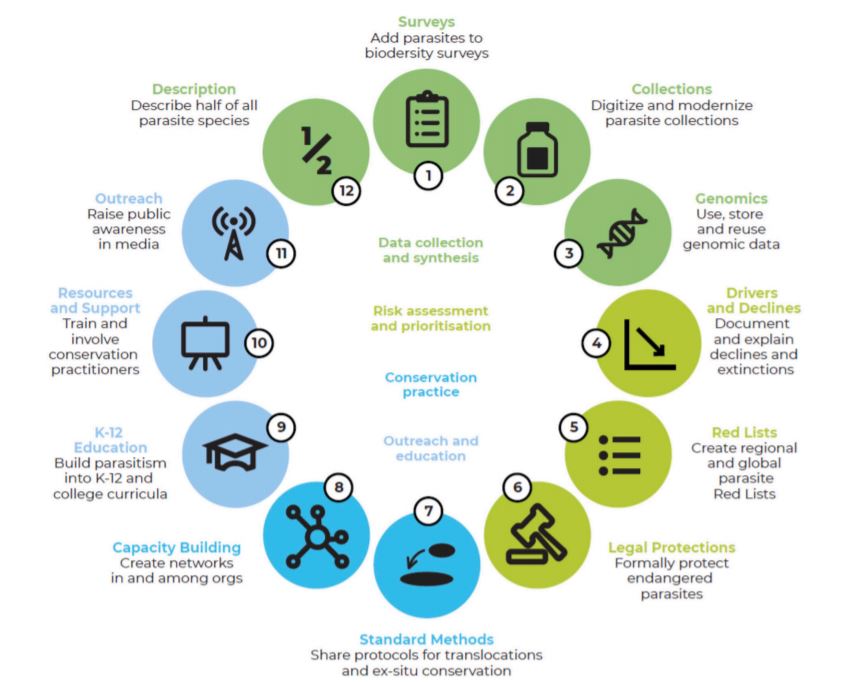
There are loads of creatures that need preservation help. Cuddly animals like pandas and koalas, or brainy mammoths like whales and octopuses, just to give some examples. In any case, a group of researchers is asking us to not overlook one especially unlovable gathering that likewise needs our help: parasites.
Parasites, the group clarifies, have somewhat of a PR issue. They're not simply parasitic beasts, or freeloading devils (which, don't misunderstand us, they despite everything are). As the group says, parasites likewise perform unimaginably noteworthy environmental jobs.
Parasites impact the endurance and proliferation of many host species, and structure essential connections across evolved ways of life. For instance, they increment savage fowls' killifish kills by up to multiple times by playing with the fish's cerebrums such that makes them more powerless against the winged animals. Oh dear, such a significant number of these muddled collaborations are obscure to us.
"Parasites are a fantastically different gathering of species, however as a general public, we don't perceive this natural decent variety as important," says biologist Chelsea Wood from the College of Washington.
"The purpose of this paper is to stress that we are losing parasites and the capacities they serve without remembering it."
The paper is a piece of a whole issue of the diary Organic Preservation dedicated to parasite protection. There's an article about how endeavors to spare parasitic host species despite everything compromise the parasites because of contrasts in bondage, and one on how we survey the preservation status of parasites. The focal point of Wood's group's paper is on the best way to make a worldwide parasite preservation plan.
"Found all through the tree of life and in each environment, parasites are the absolute generally assorted, biologically significant creatures on Earth - however in practically all cases, the least secured by untamed life or environment preservation endeavors," the creators clarify in their paper.
"Our working gathering distinguished 12 objectives for the following decade that could propel parasite biodiversity preservation through an aspiring blend of exploration, backing, and the board."
Presently, it may sound somewhat unusual to get so put resources into parasites, when we're not even sure how all the creatures they live in are faring, and when a wide range of animal varieties are confronting termination dangers.
As the group clarifies, cuddly or alluring creatures get the main part of financing with regards to protection, and we've just distinguished around 10 percent of the parasites that occupy them. That is an issue.
"In the event that species don't have a name, we can't spare them," says co-lead creator Colin Carlson, a scholar at Georgetown College.
"We've acknowledged that for a considerable length of time about most creatures and plants, yet researchers have just found a small amount of a level of the considerable number of parasites on the planet. Those are the last boondocks: the remote ocean, profound space, and the world that is living inside each specie on Earth."
The group of specialists from the US, Spain, and Australia have distinguished 12 objectives for the following decade to help keep our parasitic companions around for a long time into the future.
 (Carlson et al., Biological Conservation, 2020)
(Carlson et al., Biological Conservation, 2020)As should be obvious in the picture over, these objectives are aspiring. Everything from instruction about parasitism to officially ensuring imperiled parasites needs to complete.
The twelfth objective however, may be the most spearheading of all.
"In the soul of that challenge, we propose a last aggressive objective: portray half of parasite assorted variety on Earth," the group composes.
"A few targets will be hard to gauge, and introductory evaluations will have wide certainty stretches, particularly for bunches like parasites of invertebrate has that are under depicted and under-spoke to in biodiversity information. All things being equal, methodicallly utilizing the best-accessible strategies to characterize beginning 50 percent portrayal targets will inconceivably improve our comprehension of worldwide parasite biodiversity."
Only a note here that the group isn't centered around human or tamed creature parasites – so you don't have to stress over them officially ensuring the ring worm, ticks, or lice we as a whole know and love (or abhor).
However, that doesn't imply that the specialists don't anticipate some kickback, particularly from those not as of now in the parasite science corner.
"Completely depicting 50 percent of parasite biodiversity, similar to the various objectives distinguished here, could be excused as excessively aspiring and too low need given the numerous fronts on which assets for combatting worldwide change science are as of now spread far," the group composes.
"Environmental change, rising infections, and mass eradication are now amazing emergencies that urgently need more work force and subsidizing.
"Be that as it may, we accept all accessible logical proof proposes that dismissing the concealed universe of parasites just restricts our adequacy in facing these different conflicts, and will prompt more and more awful startling results."
So next time you consider creatures that need securing, possibly save an idea for the unassuming parasite. Or then again we may wind up losing these animals and any imperative job they play inside our biological systems before we even find what they are.






No comments